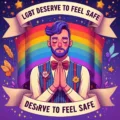Understanding What It Means to Be an LGBTQ+ Ally
Being an LGBTQ+ ally is about more than just accepting or tolerating people with diverse sexual orientations and gender identities. It’s about actively supporting, advocating for, and standing up for the rights and wellbeing of LGBTQ+ individuals. True allyship requires compassion, education, and a commitment to creating a more inclusive world for all.
As allies, we have the power to make a real difference in the lives of LGBTQ+ people. By educating ourselves, speaking out against discrimination, and offering unwavering support, we can help create safer and more welcoming environments for everyone, regardless of their sexual orientation or gender identity.
Educating Yourself on LGBTQ+ Issues
One of the most important steps in becoming a better LGBTQ+ ally is educating yourself. This means taking the time to learn about:
- LGBTQ+ terminology and identities
- The history of the LGBTQ+ rights movement
- Current issues facing the LGBTQ+ community
- Intersectionality and how different forms of discrimination intersect
Remember, it’s not the responsibility of LGBTQ+ individuals to educate you. There are many resources available online, in libraries, and through LGBTQ+ organizations. Take initiative in your learning journey and be open to new information and perspectives.
Listening and Amplifying LGBTQ+ Voices
Being a good ally means being a good listener. Take the time to hear the experiences, concerns, and needs of LGBTQ+ individuals. Remember that each person’s experience is unique, and avoid making assumptions or generalizations.
When you have the opportunity, use your privilege to amplify LGBTQ+ voices. This could mean:
- Sharing content created by LGBTQ+ individuals on social media
- Recommending LGBTQ+ authors, artists, and businesses
- Inviting LGBTQ+ speakers to events or panels
- Supporting LGBTQ+ colleagues in workplace discussions
By elevating LGBTQ+ voices, you help ensure that their perspectives are heard and valued in various spaces.
Speaking Up Against Discrimination and Microaggressions
A crucial part of being an ally is speaking up when you witness discrimination or microaggressions against LGBTQ+ individuals. This can be challenging, but it’s essential for creating change. Here are some ways to intervene:
- Calmly point out problematic language or behavior
- Educate others on why certain terms or actions are harmful
- Support the person being targeted and check in with them afterward
- Report incidents of discrimination to appropriate authorities
Remember, silence in the face of discrimination can be interpreted as acceptance. By speaking up, you show LGBTQ+ individuals that they have support and that discriminatory behavior is not acceptable.
Creating Inclusive Spaces and Practices
As an ally, you can work to create more inclusive spaces in your workplace, school, community organizations, and personal life. Some ways to do this include:
- Using inclusive language and avoiding assumptions about gender or sexual orientation
- Advocating for gender-neutral bathrooms and inclusive policies
- Encouraging the use of pronouns in introductions and email signatures
- Supporting LGBTQ+ events and organizations in your community
- Ensuring LGBTQ+ representation in decision-making processes
By actively working to create inclusive spaces, you help foster environments where LGBTQ+ individuals feel safe, respected, and valued.
Supporting LGBTQ+ Rights and Advocacy
Being an ally also means supporting LGBTQ+ rights on a broader scale. This can involve:
- Staying informed about LGBTQ+ rights legislation
- Contacting your representatives to support LGBTQ+-friendly policies
- Voting for candidates who support LGBTQ+ rights
- Donating to or volunteering with LGBTQ+ advocacy organizations
- Participating in Pride events and other LGBTQ+ celebrations
Remember that allyship is an ongoing process. Laws and societal attitudes are constantly evolving, so it’s important to stay engaged and continue learning and advocating for LGBTQ+ rights.
Frequently Asked Questions About Being an LGBTQ+ Ally
1. What if I make a mistake or say something offensive unintentionally?
If you realize you’ve made a mistake, apologize sincerely, learn from the experience, and do better in the future. Everyone makes mistakes, and what matters most is how you respond and grow from them.
2. How can I support an LGBTQ+ friend or family member who’s coming out?
Listen to them without judgment, express your love and support, ask how you can best support them, and respect their privacy regarding who they want to tell and when.
3. What should I do if I witness bullying or discrimination against an LGBTQ+ person?
Intervene if it’s safe to do so, support the person being targeted, report the incident to appropriate authorities, and offer continued support to the person affected.
4. How can I make my workplace more LGBTQ+ friendly?
Advocate for inclusive policies, use inclusive language, respect people’s pronouns, support LGBTQ+ colleagues, and promote LGBTQ+ awareness and education in the workplace.
5. Is it okay to ask questions about someone’s LGBTQ+ identity?
While it’s natural to be curious, it’s important to respect people’s privacy. If someone chooses to share information about their identity, listen respectfully. Avoid asking intrusive questions about personal matters unless the person has indicated they’re comfortable discussing them.
Remember, being an LGBTQ+ ally is a journey of continuous learning and growth. By approaching allyship with compassion, humility, and a genuine desire to create positive change, you can make a real difference in the lives of LGBTQ+ individuals and contribute to a more inclusive and accepting world for all.









